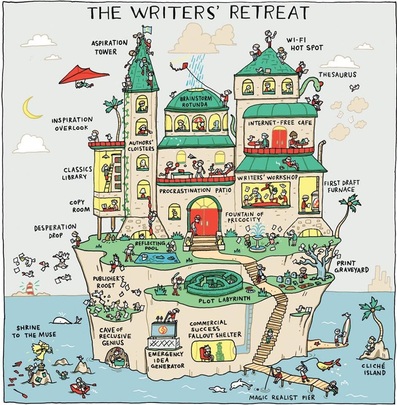
But Facebook is a very different platform to Twitter and needs to be approached differently. So here are my tops five tips for how writers should interact with Facebook.
1. Separate You From The Writer - I imagine you already have a Facebook profile and therefore a few hundred friends who see your posts on a regular basis. You do not want to annoy these people by bombarding them with information about your writing. Even your best friends might not be fans of the genre that you write. Plus, you originally connected with people on Facebook because you want to hear about their lives, not because you wanted them to buy your book.
You therefore have two options: either start a completely fresh Facebook profile just for your writing or start an author Facebook page. I would recommend the latter. A Facebook page is essentially a profile within Facebook focused on a business, TV show, character or celebrity. Facebook users can Like the page and then receive posts from that page in their newsfeed. It is basically a chance for fans to see content generated by the people behind their favourite things and people. For instance, if you Like the Tyrion Lannister page then you will see lots of Tyrion fan art popping up amongst your usual Friends' posts.
By starting your own author page, you will be offering your Facebook Friends the option of Liking it. If they Like it, they have stated an interest in your writing and will see your posts. If they do not Like it, they will never see your posts, never get annoyed with you and happily stay Friends with you in the traditional way.
2. Start An Author Page, Not A Novel Page - the page should be about you as an author and not about your novel. My first novel is called The Sheriff but I did not start a page called The Sheriff because I hope to write a second book with a completely different name and a third and a fourth. I do not want to start a new page for every novel that I write, nor do I want to start gathering Likes from a starting point of zero each time. As an author, you are the brand, not your latest novel. Therefore, focus on building an author Facebook page.
3. Post High Quality Content - Facebook, like many social media sites, is designed to be fun and interactive. Therefore, you need to post entertaining content and not just pleas for people to buy your book. You want your fans to Like your posts, comment on them and especially share them. This way, your posts will appear in your fans' own newsfeeds and hopefully get seen by people who do not even know you. This is how things go viral and why complete strangers will be drawn to your page and your writing.
Entertaining content includes funny statuses, photos, cartoons (see above), videos and questions. Entertaining does not necessarily mean funny. It can also mean interesting, shocking, memorable and informative. Think about the posts that grab your attention when you are scrolling through the newsfeed. Before you post, ask yourself, 'What's in it for them?'
Of course, your content should always be relevant and related to your writing. A picture of a cat, no matter how funny, should never be posted from your author page. Fans of your page have Liked it because they are interested in your writing. Possible posts could therefore be an early draft of your new book cover, a poll about which title your fans prefer for your short story collection, a video of you speaking at a poetry evening, a funny cartoon about how writers cope with writers' block, a photo of you undertaking research for your next novel, and so on.
Just remember: keep it entertaining, keep it relevant.
4. Do Not Overshare - posting good content is essential but do not overshare. Facebook is not Twitter. You can post as much as you want on Twitter because it is designed to be a constant stream of information. However, with Facebook, you do not want to bombard your fans. A post every few days is enough. Facebook users' primary reason for logging in is to see what their friends have been doing. They want their newsfeed predominantly about people they know, which is why each Facebook user will only like a handful of pages. Therefore, if a Facebook user has been generous enough to Like your page, do not abuse that privilege. Post well but post sparingly.
5. Remember Your Website - as always, you want to drive people back to your personal website because you own your website. Facebook and Twitter are fantastic platforms that seem destined to be here forever but they might crash one day, just like MySpace. If this happens then you would lose all of the content that you worked so hard to post. Even if Facebook goes on and on, you cannot control Facebook policy. If they decide to abolish Facebook pages one day then, again, all of your hard work will disappear.
As such, do not treat your Facebook page as a substitute for a website. Your own personal website is always the priority so use your Facebook page as another useful platform to guide your fans back to your author website. You can do this by posting links to blogs that feature on your website, or galleries of photos that you have put up there. You do not have to force it, nor should you do this with every single one of your Facebook posts, but keep your website in mind. Traffic on your website is always your ultimate goal.
You can check out my author Facebook page as an example. Feel free to Like it whilst you are there!
